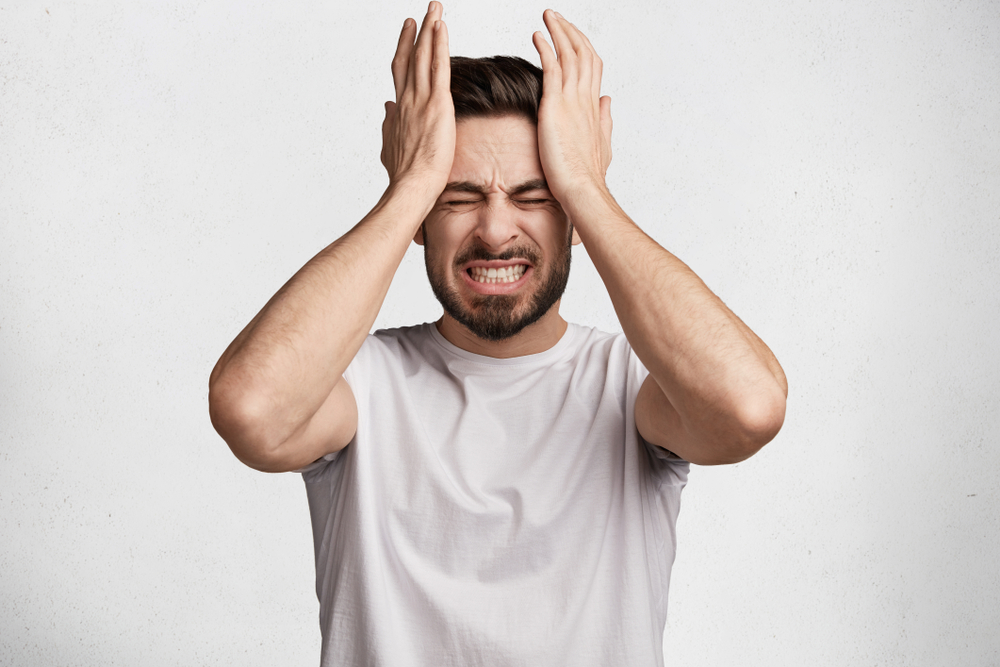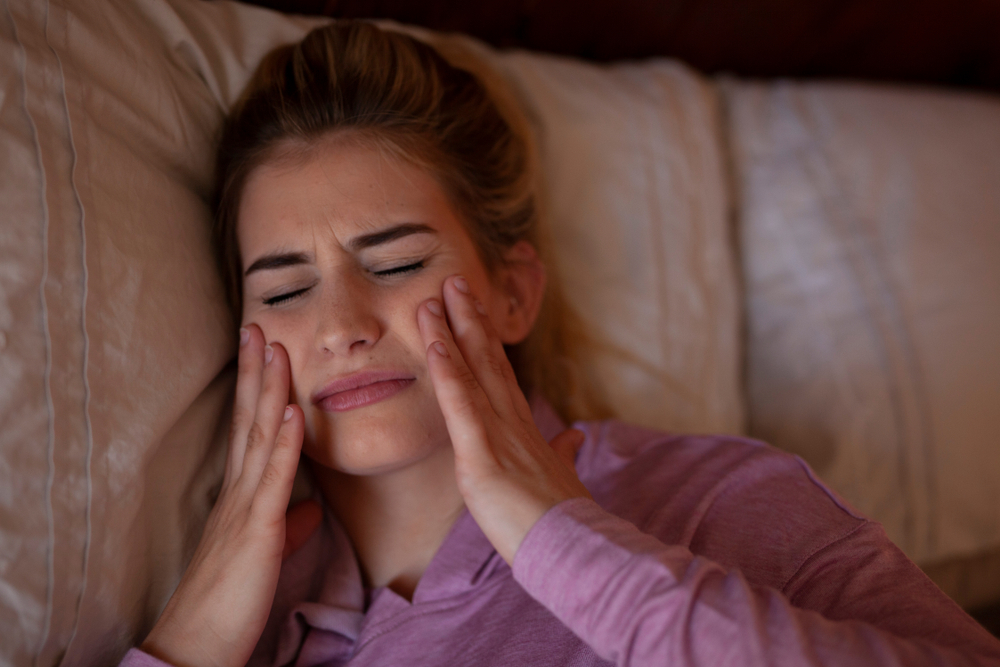Last Updated:
June 10th, 2025
Teeth Clenching Caused by Addiction
When you are struggling with drug or alcohol addiction, it is easy to wear a smile and say you’re fine. But your jaw often reveals the hidden truth underneath. Teeth clenching, bruxism (teeth grinding) and pain in your mouth can all develop with various forms of substance abuse. They can be embarrassing, uncomfortable and, in some cases, even lead to urgent medical complications. It is important to understand how these symptoms are linked to addiction and what they reveal about what is happening in the rest of your body. This can help you obtain the right medical support and initiate rehabilitation treatment before a minor issue becomes something far more serious.

What is meant by “teeth clenching”?
Teeth clenching is when your jaw muscles tighten, and your teeth press together with force without you choosing to. It may happen while you’re awake and tense or during the night when your body’s trying to rest, but your muscles won’t relax.
Most people aren’t even aware they are clenching their teeth until they notice a stiff jaw in the morning, aches and pains in their face or loose or sensitive teeth. If teeth clenching persists, it can wear down your enamel, shift your bite and trigger chronic headaches or facial pain.
Teeth clenching is sometimes grouped under the broader term bruxism, which includes grinding your teeth as well. Some people clench or grind because of stress or anxiety. Others do it as part of an overstimulated nervous system. In many cases, teeth clenching is part of a bigger pattern where your body reacts physically to some emotional or chemical issue, especially in the context of alcohol or drug addiction.
How can addiction cause teeth clenching?
When your brain is overloaded, your body seeks ways to manage the pressure, and one of the most common places it lands is in your jaw. Teeth clenching then becomes a coping mechanism, a physical outlet for the constant state of stress caused by drug use, cravings or withdrawal.
Methamphetamine is one of the most well-known triggers of teeth clenching and other issues. Meth triggers the release of norepinephrine which causes bruxism, dry mouth, meth jaw clench and poor oral hygiene. Many people experience meth teeth grinding so severe that it leads to “meth mouth”. This is a painful complication of meth addiction that causes tooth loss, gum disease and a potential route for dangerous infections to enter your body.
Cocaine and crack are also major culprits, as the drug-induced adrenaline rush, anxiety, and muscle tightening can lead to severe jaw strain. Over time, this causes dental erosion, facial soreness and that unmistakable “crack addict teeth” appearance, which can be very embarrassing.
Even prescription medications can cause teeth and mouth issues. Benzodiazepines like Xanax sedate the body during use, but they can create serious rebound tension during withdrawal. Xanax bruxism is the term used to describe involuntary clenching or grinding that happens when the calming effects wear off. If you are coming off benzos and noticing jaw tightness or new damage to your teeth, this could be your nervous system overcompensating during the crash.
Common signs of teeth clenching to look out for
Teeth clenching doesn’t always make itself obvious, especially if it happens while you’re asleep or in the middle of a high or crash. Here are some of the most common signs to watch for, especially if substance use is involved:
What are the dangers of ignoring teeth clenching?
Ignoring teeth clenching doesn’t just risk dental damage; it can also spiral into more serious physical, mental and emotional harm.
Clenching is often linked to intense anxiety or trauma, and the longer it goes on, the worse the emotional symptoms can get. The constant pain and shame can become a huge barrier to recovery, with people isolating themselves, avoiding dentists and sometimes relapsing to escape the pain and embarrassment.
There is also a big risk of long-term infection. With chronic teeth clenching and bruxism, the constant pressure causes micro-tears in the gums and leaves the roots of your teeth exposed. If these get infected as they often do with poor oral hygiene (common with addiction), you could face bone loss or infections that spread to your jawbone, brain or bloodstream.
Teeth clenching can also misalign the jaw permanently, shift how your teeth sit together, and, in some cases, lead to temporomandibular joint (TMJ) dysfunction. This is a condition that causes chronic pain, clicking and lockjaw. For people struggling with meth mouth or crack addict teeth, these mechanical problems often combine with tooth loss and infection to create a relentless cycle of shame, pain and depression.

What should I do if I notice teeth clenching in myself or a loved one?
Teeth clenching, grinding and symptoms like meth mouth are signs that your body is under overwhelming stress. At Addiction Helper, we take these symptoms seriously because we understand the significant damage they can cause. If you are ready to get support that sees the full picture, we’re here to help. Contact us today and take the first step towards getting your health and your confidence back on track.
Our compassionate team are ready and available to take your call, and guide you towards lasting the lasting addiction recovery you deserve.
Frequently Asked Questions
(Click here to see works cited)
- Teoh, Leanne, and Geraldine Moses. Drug-induced bruxism – PMC, 1 August 2019, https://pmc.ncbi.nlm.nih.gov/articles/PMC6698238/. Accessed 21 May 2025.
- Aldosari LIN, Hassan SAB, Alshahrani AA, et al. Prevalence of temporomandibular disorders among psychoactive substances abusers: A systematic review and meta-analysis. J Oral Rehabil. 2023; 50: 894-901. doi:10.1111/joor.13513
de Baat, Cees et al. “Medications and addictive substances potentially inducing or attenuating sleep bruxism and/or awake bruxism.” Journal of oral rehabilitation vol. 48,3 (2021): 343-354. doi:10.1111/joor.13061

